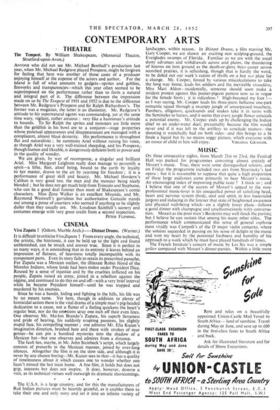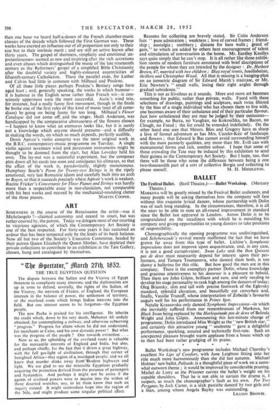MUSIC
ON three consecutive nights, from March 21st to 23rd, the Festival Hall was packed for programmes consisting almost entirely of Mozart's music. True, there were some distinguished soloists, and on Friday the programme included two airs from Stravinsky's last opera ; but it is reasonable to suppose that quite a high proportion of these large audiences came primarily to hear Mozart's music. An encouraging index of improving public taste ? I think so ; and I believe that one of the secrets of Mozart's appeal to the non- professional music-lover is his unequalled power of satisfying head, heart and nervous system (body, soul and spirit, in less materialist jargon) and inducing in the listener that state of heightened awareness and physical well-being which—on a slightly lower plane—follows a good dinner with champagne and unselfconsciously witty conversa- tion. Mozart as the poor man's Boulestin may well shock the purists; but I believe he can sustain that among his many other roles. The performance which communicated this sense of general euphoria most vividly was Campoli's of the D major violin concerto, where the soloists succeeded in passing on his sense of delight in the music and won my heart by the perennial freshness and humility of his approach to a work which he must have played hundreds of times.
The French Institute's concert of music by Les Six was a simple go titer compared with Mozart's dinner-parties. Within a little more than one hour we heard half-a-dozen of the French chamber-music classics of the decade which followed the First German war. These works have exerted an influence out of all proportion not only to their size but to their intrinsic merit ; and are still an active leaven after thirty years. The gospel of shortness, simplicity and emotional un- pretentiousness seemed as new and inspiring after the rich accretions and even abuses which distinguished the music of the late nineteenth century as the Reformers' gospel of a simplified Bible Christianity after the doubtful variety and highly-coloured eccentricities of fifteenth-century Catholicism. There the parallel ends, for Luther and Calvin had little in common with Milhaud and Poulenc.
Of all these little pieces perhaps Poulepc's Bestiary songs have aged least ; and, generally speaking, the works in which humour— it is humour in the English sense rather than French wit—is con- sciously uppermost were the most successful. Auric's wind trio, for instance, had a really funny first movement, though in the finale he broke one of the first rules of this kind of music (and of all come- dians) by going on being funny for too long. Milhaud's Flower Catalogue did not come off, and the singer, Hedli Anderson, was handicapped by the comparative abstruseness of the flowers chosen —I happen to know what an eremurus looks like, but it is surely not a knowledge which anyone should presume—and a difficulty in making the words, on which so much depends, perfectly audible.
Denis Apivor's violin concerto was the most original work in the B.B.C. contemporary-music programme on Tuesday. A single violin against seventeen wind and percussion instruments might be thought to be doomed from the start, but Alan Loveday held his own. The lay-out was a successful experiment, but the composer ptits down all his cards too soon and anticipates his climaxes, so that the effect of the work is, paradoxically, slightly monotonous. Humphrey Searle's Poem for Twenty-two Strings is in the ripely emotional, very late Romantic idiom and carefully built into an arch or Bogen, so that it succeeds precisely where Apivor's work is weakest. Racine Fricker's Concertante for Three Pianos and Strings was hardly more than a respectable essay in neo-classicism, not comparable with his best works and marred by the mechanical-sounding clatter



































 Previous page
Previous page